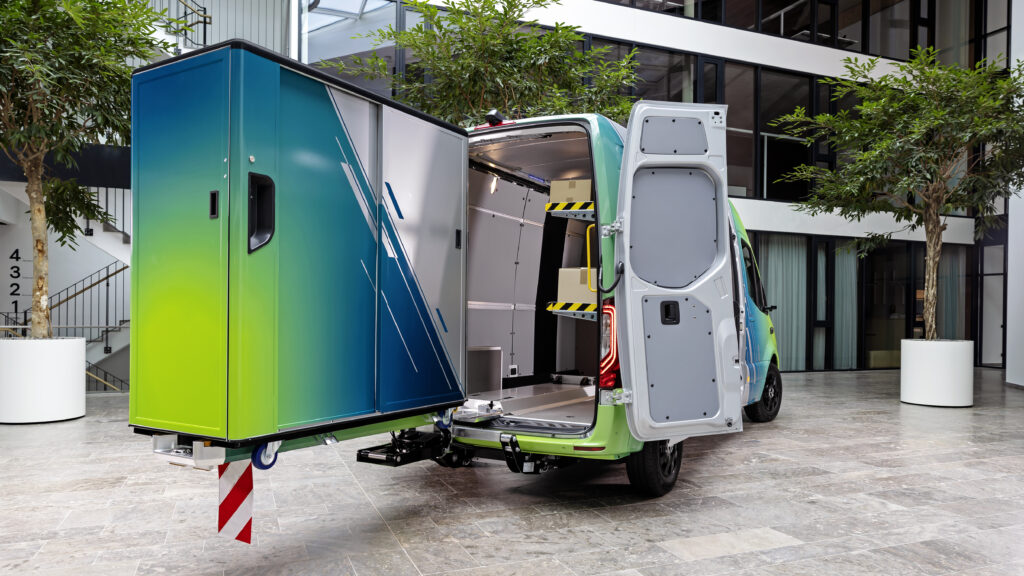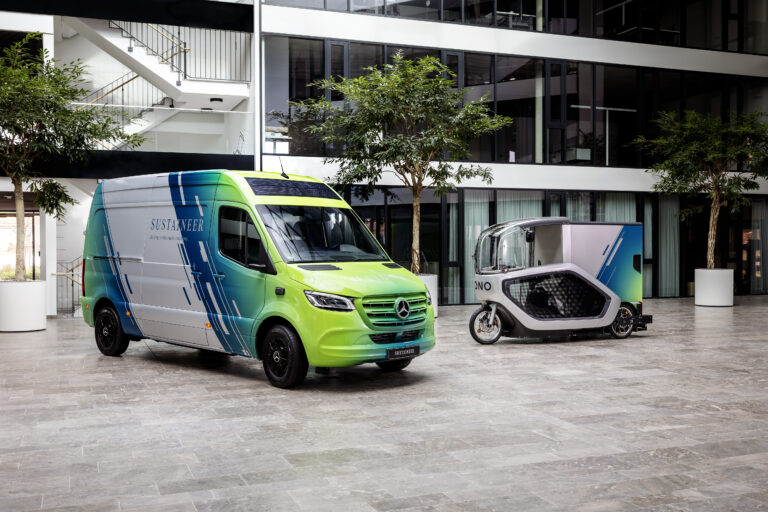Mercedes-Benz Vans has introduced a new development to its Sustaineer (Sustainability Pioneer) technology demonstrator that provides an efficient logistics concept for last-mile delivery with zero local CO2-emissions.
In cooperation with the Berlin-based cargo bike manufacturer Onomotion, Mercedes-Benz is combining the all-electric van and the electric cargo bike to create a seamless supply chain. The eSprinter becomes a mobile micro-depot that brings pre-packaged goods in special containers to cargo bikes, which take care of delivery to the front door.
Transferring the goods to the ONO e-cargo bike takes just a few minutes. As a result, the eSprinter does not have long idle times and can continue straight away – either to the next cargo bike or to deliver goods itself. Parallel delivery with cargo bikes and all-electric vans increases efficiency and shortens delivery times in both urban and rural areas. The innovative logistics concept is suitable for a wide range of industries – from courier, express and parcel services to large bakeries, service providers for workwear and company textiles or food suppliers, according to Mercedes-Benz.
Reducing traffic and delivery times
The consignments can be pre-picked in the logistics center according to the delivery route and loaded into the interchangeable wheeled Onomotion containers. The all-electric van then transports them to the handover point, where they are loaded onto the e-cargo bike. The special wheeled containers offer a load volume of more than 70ft3 and a payload of up to 440 lb. They can be flexibly configured for various applications, such as parcel delivery.
The Mercedes‑Benz Sustaineer presents an integrated lifting arm customized for these containers. The container lift works hydraulically, has recessed rollers, and can be controlled electronically via a hand-held transmitter. This enables the containers to be loaded and unloaded quickly, safely and effortlessly.
Two containers fit into the new eSprinter configured as a long panel van with a high roof, with enough space for a shelving system to transport additional bulky goods. The shelving system can be accessed at any time, even when the containers are loaded, via the right-hand rear door.

Efficient delivery in the last mile
The all-electric van stops at defined points along its route and transfers the containers to an ONO e-cargo bike in a few simple steps for more efficient and sustainable last-mile delivery.
The eSprinter can also return to the logistics center to complete a second route. By dispensing with micro-hubs, CEP service providers can deliver more parcels per day, shortening delivery and waiting times, and thus reduce costs. Initial dialog with courier and parcel service providers has already begun to ensure that the individual needs of the industry are considered in further development, Mercedes-Benz says.
Carbon-neutral fleet
All technical solutions and concepts installed in the Sustaineer were designed with a view to possible series-production application in future Mercedes-Benz vans. These include a solar panel on the roof, components made from recycled materials and a mobilization seat for the driver.
Mercedes-Benz has set itself the target of making the entire fleet of new commercial and private vans net-carbon-neutral along the entire value chain and the entire lifecycle by 2039. The key levers for this are the electrification of the vehicle fleet, the extensive use of recycled materials and the use of renewable energies in production and when charging the vehicles.
Mercedes‑Benz Vans already offers a fully electric version of every commercial and private van. By 2030, they are expected to make up more than 50% of total sales. The company’s own production plants have been net-carbon-neutral since 2022.
To discover more about Sustaineer, click here.


